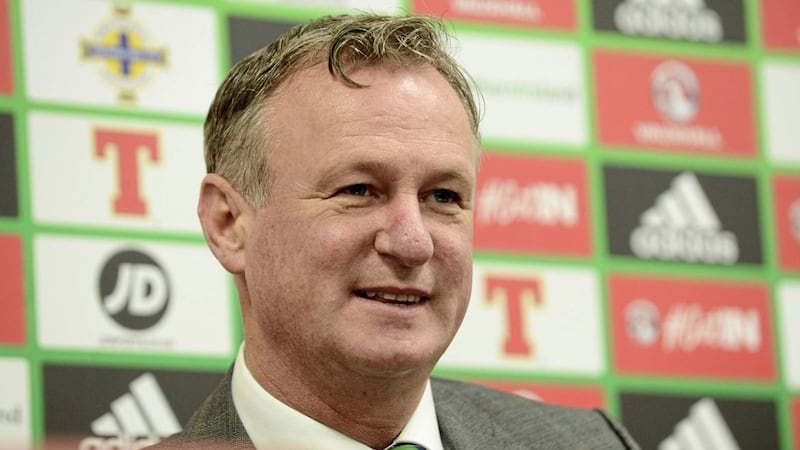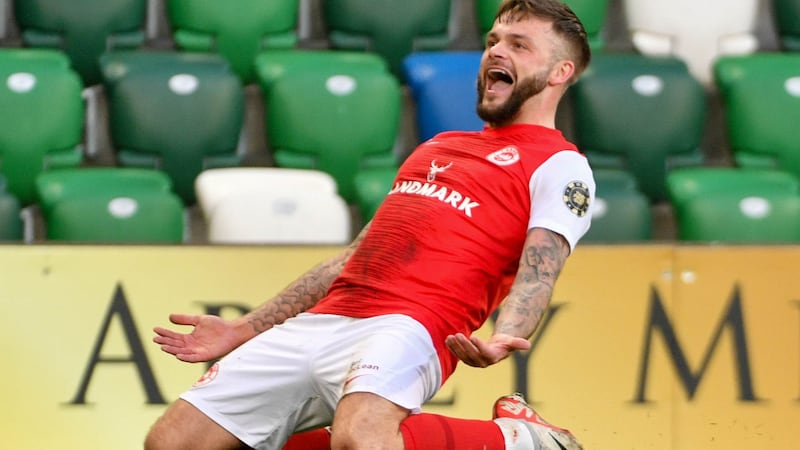Gambling in soccer goes to the highest levels – involving national associations and managers.
That much is clear from the saga involving Michael O’Neill and the Irish and Scottish Football Associations.
O’Neill finally decided earlier this week to stick with the former rather than twist to the latter.
Unlike with most gambles, it will take some time to tell whether or not this one will pay off.
It’s been reported in some – mainly Scottish – quarters that O’Neill will earn more from the IFA than the SFA were prepared to offer, but there seems more than a whiff of sour grapes to that.
O’Neill is not majorly motivated by money.
His pride in achieving success with Northern Ireland is very evident.
He truly enjoys the role, to the extent that he has turned down job offers from major clubs in England and Scotland.
Recently, though, it seemed like O’Neill was in the middle of a long drawn-out break-up.
The IFA has behaved in a very dignified manner throughout. Although the Windsor Park decision-makers made it clear they wanted to retain O’Neill’s services, they didn’t ‘smother’ him with attention, or pressurise him into making a decision.
There’s no doubt about the losers in this high stakes game, the Scottish Football Association.
Not long after they sacked Gordon Strachan it became clear that O’Neill was their number one target. Indeed he appeared to be their only target.
Such interest is clearly flattering, even if the SFA lessened that somewhat by taking a long time to agree how much they would offer him and decide that they would meet the compensation clause in his IFA contract.
The IFA moved more quickly, ‘going large’, as they had to in order to show how much they wanted to keep their man, hence the offer of a much improved contract, financially and in duration.
Yet with O’Neill it’s about the bigger picture, not merely the bottom line.
The IFA deal of a four-year extension (taking him up to June 2024), assuming he signs it, will give him the time and space to continue shaping the structures of Northern Irish football.
Job security was certainly a factor.
The fact O’Neill lives in Edinburgh was portrayed as a ‘pro’ for the SFA’s chances – but it could also have been a ‘con’ in terms of increased scrutiny of him and his family in their daily lives.
Those who confidently declared that Scotland have much better players for O’Neill to work with than Northern Ireland do then struggled to name this supposed series of stars.
The big appeal seemed to be that O’Neill could make himself ‘a Scotland legend’ if he secured them qualification for a major tournament for the first time in more than two decades.
Yet that simply doesn’t have the same pull for someone who isn’t Scottish, despite O’Neill’s long links with that country, going back to his early professional playing days, joining Dundee United from Newcastle in 1989, then moving to Hibernian, as well as his management career starting in Scotland.
The Scots are understandably more desperate than ever to be involved in Euro 2020 as that tournament will include games being played at Hampden Park in Glasgow.
There’s a downside to that desperation, obviously.
You can have whatever odds you like against the SFA – and, more importantly, the Scottish media and supporters – allowing their new manager to go his first nine games without recording a win.
Then you can double the odds if you think that a Scotland manager would survive losing a qualifier to Luxembourg, as O’Neill did in September 2013.
Not many NI supporters or media called for his head then and enough – although not all – people of influence within the IFA backed him.
That faith proved entirely justified, as those of us who viewed performances rather than results felt it would. Within two years O’Neill had secured qualification for a major tournament, NI’s first for three decades.
There’s no guarantee, of course, that O’Neill will secure qualification for Euro 2020, or the 2022 World Cup.
However, he is the most likely man to do so, as he has proven by reaching Euro 2016 and getting into the play-offs for this year’s World Cup.
In a sense, O’Neill has already earned his future salary increase in the form of the income derived from reaching the last 16 of Euro 2016.
The gamble for O’Neill is whether he can squeeze more success out of a small talent pool.
As has been well-documented, Gareth McAuley and Aaron Hughes are in their late 30s and skipper Steven Davis and Chris Brunt will be in their mid-30s by the time Euro 2020 comes around.
O’Neill, typically, has been working hard to increase the playing resources available to him and NI.
George Saville and Jordan Jones made their senior debuts late last year, the former against World Cup-holders Germany, the latter in the second leg of the play-off in Switzerland.
O’Neill and his support staff constantly scout and sniff around, seeking out those who could augment the NI set-up.
Few *cough* knew, for example, that Jamal Lewis, who scored Norwich City’s recent FA Cup replay equaliser at Chelsea, has been involved with Northern Ireland U21s.
Michael knew. Michael knows.
I’m not much of a betting man, but for my money Michael O’Neill has made the right call.








